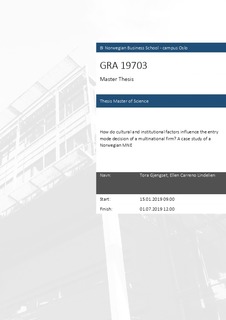How do cultural and institutional factors influence the entry mode decision of a multinational firm? A case study of a Norwegian MN
Master thesis
Permanent lenke
http://hdl.handle.net/11250/2625290Utgivelsesdato
2019Metadata
Vis full innførselSamlinger
- Master of Science [1621]
Sammendrag
This Master Thesis investigates how cultural and institutional factors affect the
entry mode choice of a multinational firm. Previous research has found equivocal
results regarding the effect of these factors on the entry mode choice. One metaanalysis
has found that one third of all studies found one particular effect, another
third found the opposite, and the last third found no effect. The span of the results
is therefore wildly conflicting, and in need of further investigation. We therefore
conducted a singular case study on a multinational firm in order to gather
information-rich data on the effect of these factors on the entry mode decision.
We conducted semi-structured interviews with employees from each of the
regions that the firm operates in. These employees have been present in the early
stages of market entry and can therefore paint a comprehensive picture of the
factors that affect the entry mode choice.
We found that cultural and institutional factors did not have an effect on the entry
mode choice, but rather on the establishment mode, the ownership structure, and
on the type of partner used, whether local or foreign. Throughout the paper we
refer to these as variations within the entry mode choice. The entry mode choice
was found to be determined by firm- and industry characteristics, and the firm
uses a partnership structure in all markets in which they operate in order to reduce
the amount of resources committed in each market and to reduce the risk that is
tied to the high failure rate of the industry.
Beskrivelse
Masteroppgave(MSc) in Master of Science in Business, Strategy - Handelshøyskolen BI, 2019
